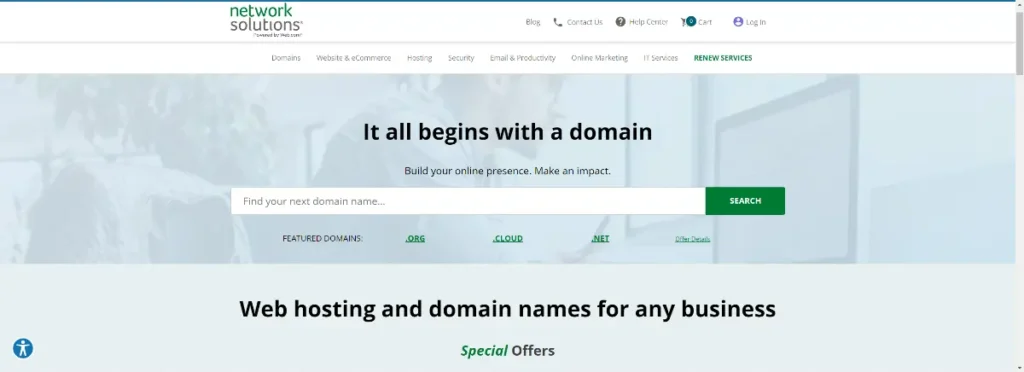In this article, we will present you with 7 expert-recommended alternatives to GoDaddy, to assist you in making an informed decision. Before diving into the list, it’s important to understand some key factors that may influence your choice of web hosting provider.
The world of domain registration and web hosting is highly competitive, with many companies vying for the attention of entrepreneurs, small business owners, and website builders. One of the most well-known companies in this space is GoDaddy, which has been around since 1997 and currently manages over 77 million domain names. However, for many users, GoDaddy’s services may not be the best fit for their needs, whether it’s due to pricing, features, or customer support.
According to recent surveys, the cost was the top concern when choosing a domain registration and web hosting provider. Additionally, the respondents said they valued customer support and also prioritized the availability of additional features such as email hosting and website builders.
With these factors in mind, we’ve researched and compiled a list of seven GoDaddy alternatives that offer competitive pricing, strong customer support, and a variety of features to meet the needs of different types of users. These alternatives also have strong security measures in place to protect your website and customer data.
So, it will be helpful for anyone looking for an alternative to GoDaddy for their domain registration and web hosting needs.
7 Best GoDaddy Alternatives of 2026:
1. SiteGround (Best GoDaddy Alternative for Small Businesses)
When compared to GoDaddy, SiteGround is an excellent choice for small businesses. It’s explicitly designed to meet the needs of eCommerce and business website owners. The customer support is quicker, and the user interface is more intuitive than in GoDaddy. Also, a 70% discount for WPBeginner users makes it perfect for small businesses.

When it comes to pricing, SiteGround’s plans are competitive with GoDaddy’s, with shared hosting plans starting at $3.99 per month. GoDaddy’s basic shared hosting plans start at $6.99 per month, but they are more limited in terms of features and resources.
SiteGround’s shared hosting plans include a free website builder, a free SSL certificate, and a free CDN service, making it easy for beginners to start building their website. GoDaddy’s basic shared hosting plan does not include these features, making SiteGround a more cost-effective option for beginners.
SiteGround also offers managed hosting solutions for WordPress, Joomla, and Magento, which are tailored to meet the specific needs of those platforms. GoDaddy also offers managed hosting for WordPress, but it’s more expensive than SiteGround’s plans.
SiteGround’s cloud hosting and dedicated server solutions provide the resources and flexibility that power users need, GoDaddy also offers cloud hosting and dedicated servers, but SiteGround’s plans are more cost-effective.
When it comes to customer support, SiteGround is known for providing excellent service. It offers 24/7 customer support through live chat, phone, and email, and also has a knowledge base and a community forum for users to get help and support. GoDaddy also offers great customer support, but SiteGround’s customer satisfaction ratings are consistently increasing.
– Karolina Turowska from US Passport Photo
2. Namecheap (More Affordable Services Comparing to GoDaddy)
Having used both Namecheap and GoDaddy for domain registration, I can affirm that the two offer similar features in terms of availability and pricing.

Namecheap stands out for its reliable customer service and excellent user experience, while GoDaddy’s performing arts are also decent. The most important difference between the two is their hosting services: NameCheap offers basic shared hosting packages, while GoDaddy focuses on more advanced plans with more storage, premium support, and higher price ranges.
This makes GoDaddy an attractive option for larger businesses looking to build a more robust website. Of course, both companies provide a variety of other services, such as web security and email protection; however, depending on your specific needs, you may prefer one over the other.
All in all, if you’re looking for domain registration or other related services, it’s worth doing a comparison between NameCheap and GoDaddy to see which one offers the best features for your project.
– Rosmy Barrios from Health Reporter
3. Bluehost (GoDaddy Alternative for WordPress Optimization)
Similar to GoDaddy, Bluehost is a domain registrant and host provider. It provides hosting options that are affordable for you to employ when building a website.

Bluehost is a wise choice if you intend to use WordPress to build a blog or website. To begin with, in 2005, WordPress formally endorsed Bluehost. Additionally, this GoDaddy substitute offers three hosting packages that are specifically WordPress-optimized.
In terms of pricing, Bluehost’s plans are competitive with GoDaddy’s. Bluehost’s basic shared hosting plan starts at $2.95 per month, while GoDaddy’s basic shared hosting plan starts at $7.99 per month. However, Bluehost’s basic plan includes features such as a free domain name, a free SSL certificate, and a free CDN service that are not included in GoDaddy’s basic plan.
When it comes to features, Bluehost offers a variety of options for different types of users. For beginners, Bluehost offers a simple website builder and a free domain name for the first year. They also offer free SSL certificates, automatic backups, and a Content Delivery Network (CDN) to improve website performance. For more advanced users, Bluehost offers VPS, dedicated hosting, and WordPress optimized hosting plans.
Bluehost’s target audience is website owners, bloggers, and small business owners who want a reliable and user-friendly web hosting service. Bluehost’s user-friendly interface and customer support make it a popular choice for beginners. It also offers a range of plans for more advanced users, making it a versatile choice for those who need more resources and flexibility.
– Rene Delgado from Shop Indoor Golf
4. GreenGeeks (GoDaddy Alternative for Environmentally Friendly Services)
GoDaddy offers pristine services with web hosting, but it has a worthy competitor in GreenGeeks. It is one of the best GoDaddy alternatives, offering awesome features at affordable rates. It stands out against GoDaddy because it is an environmentally friendly service.

Being a green host, it offers free domains and transfers to users. GreenGeeks ranks as the best web host with excellent customer support and overall features. The key features of GreenGeeks are; Reseller Hosting, Free Domain, Unlimited Storage and Bandwidth, Free Website Migration, Backup, etc.
It offers a 30-day cancellation opening for subscribers. It complements its services with a helpful, scalable, reliable support team.
– Yongming Song from Live Poll for Slides
5. Network Solutions (GoDaddy Alternative for a Classic Approach)
For domain name registration and web hosting, Network Solutions is also another popular alternative to GoDaddy. This competitor to GoDaddy was the very first domain registrar when it launched in 1991.

Network Solutions has kept up with the times, but it isn’t quite as spectacular as the other GoDaddy options on this list.
Network Solutions, however, provides more than just domain registration; they also provide website hosting, security tools, SEO services, and a web development. Costs for both the initial subscription and subsequent renewals are reasonable.
– Alex Armstrong-Paling from ToolFit
6. DreamHost (GoDaddy Alternative for Unlimited Storage and Bandwidth)
I’ve been a web developer for over 10 years, and I’ve used a lot of different web hosting providers. The best GoDaddy alternative is DreamHost. Here’s why:
DreamHost is one of the few web hosts that offer unlimited storage and bandwidth. So if your website gets a lot of traffic, you won’t have to worry about exceeding your bandwidth limit and being charged extra.

It also offers a free domain name when you sign up for a yearly plan, which is a great way to save money if you’re just starting out with your website.
And finally, DreamHost has excellent customer service. If you have any problems with your account or your website, you can contact their support team 24/7, and they’ll help you resolve the issue quickly.
So if you’re looking for a web host that offers unlimited storage and bandwidth, a free domain name, and great customer service, then DreamHost is the perfect GoDaddy alternative for you.
– Jamie Irwin from Straight Up Search
7. Domain.com (GoDaddy Alternative for Excellent Pricing and Support)
Domain.com is one of the best GoDaddy alternatives for those looking for a Domain Registrar and Web Hosting provider. It offers many of the same services as GoDaddy, including domain name registration, website hosting, email hosting, and more. It also has a wide variety of domain extensions to choose from, as well as an easy-to-use domain manager.

One of the biggest advantages of Domain.com over GoDaddy is its pricing. Domain.com offers domain names at a much lower price than GoDaddy, and they also offer discounts on renewals.
Another enormous advantage is their customer support. Domain.com has a knowledgeable and friendly customer support team that is available 24/7 to help with questions or concerns you may have.
Overall, Domain.com is a great alternative to GoDaddy for those looking for a Domain Registrar and Web Hosting provider that offers outstanding features at a lower price.
– Chris Peacock from Trickle Digital
You May Also Like:
- Which Is Better for SEO Subdomain or Subdirectory
- How Do I Start Web Development with Python?
- Best Online Payment Gateways for eCommerce Businesses
Final Words
In conclusion, GoDaddy is a well-known and popular web hosting provider, but it may not always be the best choice for everyone. As we’ve seen in this article, there are several alternative options available that offer similar services, but with unique features and pricing.
When choosing a web hosting provider, it’s important to consider your specific needs and budget. If you’re a beginner, you may want to look for a provider that offers a simple website builder and easy-to-use interface. If you’re an advanced user, you may want to look for a provider that offers more resources and flexibility.
We’ve highlighted 7 alternatives to GoDaddy in this article, including providers such as SiteGround, Bluehost, and Namecheap. Each provider offers a range of services including domain registration, website hosting, and email hosting.
Overall, SiteGround is considered to be one of the best alternatives to GoDaddy, with its high-performance services, excellent customer support, and a range of features that cater to different types of users. Bluehost is also a great alternative that offers a variety of options for different types of users and competitive pricing.
Ultimately, the best web hosting provider for you will depend on your specific needs, budget, and preferences. It’s important to do your research and compare different providers before making a decision. With the 7 alternatives we’ve discussed in this article, you’ll have a better idea of what options are available and which provider is the best fit for you.
Brett Farmiloe is the founder & CEO of Featured.com, a question-and-answer platform that connects brands with expert insights. He is a published author and has been involved with a couple of successful acquisitions (and multiple failures) with startups.





















